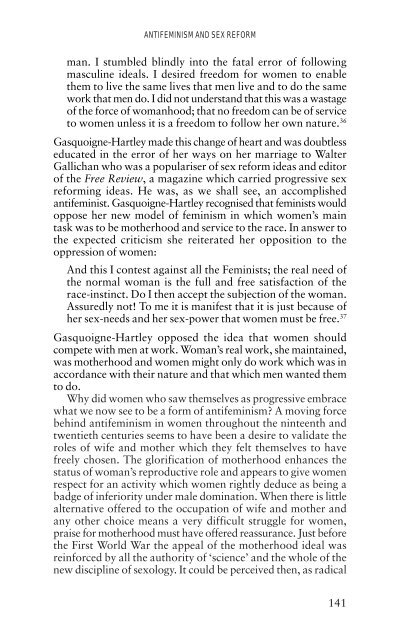The Spinster and Her Enemies - Feminish
The Spinster and Her Enemies - Feminish
The Spinster and Her Enemies - Feminish
You also want an ePaper? Increase the reach of your titles
YUMPU automatically turns print PDFs into web optimized ePapers that Google loves.
ANTIFEMINISM AND SEX REFORM<br />
man. I stumbled blindly into the fatal error of following<br />
masculine ideals. I desired freedom for women to enable<br />
them to live the same lives that men live <strong>and</strong> to do the same<br />
work that men do. I did not underst<strong>and</strong> that this was a wastage<br />
of the force of womanhood; that no freedom can be of service<br />
to women unless it is a freedom to follow her own nature. 36<br />
Gasquoigne-Hartley made this change of heart <strong>and</strong> was doubtless<br />
educated in the error of her ways on her marriage to Walter<br />
Gallichan who was a populariser of sex reform ideas <strong>and</strong> editor<br />
of the Free Review, a magazine which carried progressive sex<br />
reforming ideas. He was, as we shall see, an accomplished<br />
antifeminist. Gasquoigne-Hartley recognised that feminists would<br />
oppose her new model of feminism in which women’s main<br />
task was to be motherhood <strong>and</strong> service to the race. In answer to<br />
the expected criticism she reiterated her opposition to the<br />
oppression of women:<br />
And this I contest against all the Feminists; the real need of<br />
the normal woman is the full <strong>and</strong> free satisfaction of the<br />
race-instinct. Do I then accept the subjection of the woman.<br />
Assuredly not! To me it is manifest that it is just because of<br />
her sex-needs <strong>and</strong> her sex-power that women must be free. 37<br />
Gasquoigne-Hartley opposed the idea that women should<br />
compete with men at work. Woman’s real work, she maintained,<br />
was motherhood <strong>and</strong> women might only do work which was in<br />
accordance with their nature <strong>and</strong> that which men wanted them<br />
to do.<br />
Why did women who saw themselves as progressive embrace<br />
what we now see to be a form of antifeminism? A moving force<br />
behind antifeminism in women throughout the ninteenth <strong>and</strong><br />
twentieth centuries seems to have been a desire to validate the<br />
roles of wife <strong>and</strong> mother which they felt themselves to have<br />
freely chosen. <strong>The</strong> glorification of motherhood enhances the<br />
status of woman’s reproductive role <strong>and</strong> appears to give women<br />
respect for an activity which women rightly deduce as being a<br />
badge of inferiority under male domination. When there is little<br />
alternative offered to the occupation of wife <strong>and</strong> mother <strong>and</strong><br />
any other choice means a very difficult struggle for women,<br />
praise for motherhood must have offered reassurance. Just before<br />
the First World War the appeal of the motherhood ideal was<br />
reinforced by all the authority of ‘science’ <strong>and</strong> the whole of the<br />
new discipline of sexology. It could be perceived then, as radical<br />
141

















